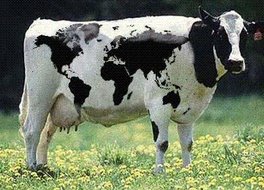1) Well, Russia wants to join WTO, does it? And will slowly decrease tariffs . . . wait, aren't we supposed to NOT be protectionists in the WTO?
Russia to join WTO2) And now Australia joins the game. More incredibly expensive cloned animals to . . . uh . . . what is it we're doing with them, now? We're not eating them yet (and they cost too much to eat, anyways). I think this is more in the same line as above -- we want to do it because the other kids all did it!
By Tom Johnston on 4/9/2007 for Meatingplace.com
Russia will become a full-fledged member of the World Trade Organization by year's end, or by the beginning of 2008 at the latest, an official said Monday at the conference "Russia-WTO: Hopes and Strategic Opportunities" in Moscow.
Economic Development and Trade Minister German Gref said it's not a matter of when, but how. In other words, the negotiation of terms on which Russia would join WTO is the top priority.
Gref said the average weighted rate of customs duties on goods and services would be reduced from 12.9 percent to 11.5 percent toward the conclusion of the transitional period. For some goods, the transitional period will be as long as seven years.
Additionally, Gref said Russia would reserve the right to satisfactory quotas on beef, pork and poultry until 2009. The country would then begin negotiations on a future quota calculation formula.
Overall, the average weighted rate of customs duties on farm produce will be reduced from 22.6 percent to 18 percent over a period of three to five years, he said.
"The degree of protection will not worsen for any group of goods," Gref said.
Aussies deliver cloned beef cow3) No, we don't eat horses here. Not wild horses. Not domestic horses. That's cruel! Now go get me my burger and chicken fries! And pick up some Lamb and Rice dog food while you're out.
By Tom Johnston on 4/17/2007 for Meatingplace.com
Scientists on Tuesday announced they cloned a beef cow, the first of its kind in Australia.
Cloning "Mini," a Brahman cattle, cost her central Queensland-based owners about $30,000, media reports indicated.
Dr. Richard Fry of Clone International explained that the process is difficult, with a success rate of about 10 percent.
"There are problems with the genetics because if we don't completely rub off the memory of the cell that we've used, then you get the incorrect expression of genes," he told reporters. "You don't get embryo forming, and they won't result in pregnancy."
Chris Fenech of the Fenech Brahman Cattle company says "Mini" was cloned from one of his family's prized stud bulls.
Wild horses run free: House votes to ban their sale for commercial processing
By Ann Bagel Storck on 4/27/2007 for Meatingplace.com
The U.S. House of Representatives on Thursday voted to prevent the sale of free-roaming wild horses and burros for slaughter.
A 1971 law originally prevented the Bureau of Land Management from selling the animals for commercial processing, but in 2004, Sen. Conrad Burns (R-Mont.) inserted a measure in a spending bill allowing their sale.
About 29,000 wild horses and burros were roaming on public lands as of February, according to BLM, which wants the number at about 27,000 to 28,000.
The House voted last year and in 2005 to end the sale of the animals, but the Senate never took up the issue.
In related news, on Wednesday, the Senate Commerce, Science and Transportation Committee approved a bill that would outlaw horse slaughter across the nation.

No comments:
Post a Comment